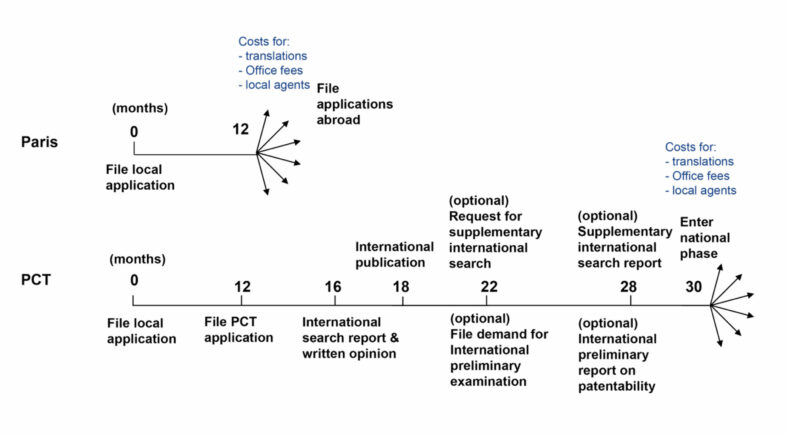Swiss startups can apply for patent protection in China after obtaining a PCT (Patent Cooperation Treaty) or Paris Convention patents [Source: WIPO]

By Simin Yang Innosuisse China Camp Manager at Swissnex in China, with Haifeng Wang, IP protection specialist in China.
November 4, 2022
How would you characterize the state of IP protection in China today?
China has conducted a series of top-down intellectual property reforms over the past years, including major judicial and legislative changes. Though China might still lag behind the EU and the US to some extent with regard to IP protection, the situation is improving significantly as China itself is accelerating towards a knowledge economy, where home-grown innovation is becoming an important source of prosperity and growth. In fact, China is ranked 11th in Global Innovation Index 2022, where technology outputs such as patent applications are highly concerned. China has expanded and improved its IP protection system considerably and is intensifying anti-counterfeiting campaigns both online and offline. For example, in 2021, China handled almost 50,000 cases of patent infringement disputes. The number of invention patents granted to foreign applicants in China increased by 23% year on year, indicating the confidence of foreign enterprises in China’s IP protection environment.
How should startups apply for IP protection in China after being granted a PCT application? Is it filed from China or WIPO?
Usually, foreign companies can protect their IP by PCT or Paris Convention. The PCT procedure consists of two main phases: the international and national phases.
International phase: companies apply to the International Bureau of WIPO or a competent national patent office. The International Bureau will search and examine whether the PCT patent should be granted.
National phase: Within 30 months after applying, a company can apply for patent protection at a designated national patent office. For example, the company should apply to the Chinese Patent Office if the PCT application is looking to be protected in China.
Generally speaking, patents granted by the International Bureau usually could be granted by local patent offices, but there are exceptions. Laws may vary in some countries.
Swiss startups can apply for patent protection in China after obtaining a PCT (Patent Cooperation Treaty) or Paris Convention patents [Source: WIPO]
Before entering the Chinese market, how should Swiss startups prepare concerning IP protection?
Preparation is instrumental for protecting intellectual property when doing business in China. Startups should develop a sound IP portfolio strategy according to the nature of their products. Different startups possess different product types concerning software, hardware, or even artwork. Therefore, the IP protection strategy will also be different.
For example, if a startup will heavily rely on brand recognition during business expansion, applying protection for its company name, logo, or main product names should be prioritized. For software products, startups can register copyrights, apply for design patents for Graphical User Interface (GUIs), or seek trade secret protection for core algorithms. Startups will also need to develop a patent filing strategy for core technologies or even consider extending additional patents for peripheral technologies.
There are three types of patents in China: invention patents, utility model patents and design patents. The application process for an invention patent usually takes 2-3 years or more, while utility model patents and design patents take substantially less time to get a grant. In addition, China has also implemented the Patent Prosecution Highway (PPH) program for priority patent examination and patent pre-examination, which can provide a faster track for patent application.
Can you share some common strategies for patent registration?
Focus on the protection of core technologies that are most valuable to your business! The patent strategy needs to be analyzed and developed in the context of the business format, geography, and technology. An ideal patent portfolio is expected to maximize the protection within the budget. Specifically, it is a trade-off for startups to consider the target regions, business format, and production location to formulate their overall patent protection plan. In practice, the targeted customers and markets will determine the focus of patent protection.
If the protection focus is on the shape of a product, the structure of a product, or a combination thereof, or the protection object is with a short product life cycle or frequent product iterations, then a utility model patent might be more appealing and cost-effective since it takes a shorter time to get a grant. If the protection focus is on the core technology, e.g., seeking long-term protection for an originally invented product, then startups may consider applying for invention patents that have a more strict examination procedure and the term of protection is up to 20 years. In addition, startups are also encouraged to expand their patent portfolio for important and innovative components and the derivatives of a product or technology.
Where should companies apply for a patent and Trademark registration in China? What is the process?
Patent applications and trademark applications are filed through the China National Intellectual Property Administration (CNIPA). Startups may choose to file a patent directly in China with the help of a patent agency, or they may file an international patent application under the Patent Cooperation Treaty (PCT). Besides, China is also a party to the Paris Convention, which provides the possibility of securing “priority” for overseas IP filings, the Hague Agreement for filing international design patent applications, and the Madrid Protocol for international trademark applications.
The examination procedure for invention patent applications in China includes five stages: acceptance, preliminary examination, publication, substantive examination, and grant and announcement. Utility model patent and design patent applications only undergo three stages: acceptance, preliminary examination, and patent insurance.
How would you advise startups to protect their IP in business meetings, trade shows or roadshows?
In principle, startups should only disclose IP information if absolutely necessary and only to a very limited level. In business meetings with manufacturers, partners, or customers, I would advise taking precautionary measures, such as signing a Non-Disclosure Agreement (NDA) before the meeting and following the minimum disclosure principle during the negotiation. Before entering into a cooperation agreement, IP-related terms should be discussed during the contract negotiation. In trade shows, startups are suggested to scan through the exhibitor list to be alerted with potential infringements and make sure patent applications are filed prior to launching new products to prevent undermining the novelty of the patent application. It is not advisable to reveal too many technical and functional details during the trade show. For roadshows, it is advisable to keep the scale small and limit participation only to your target audience. If necessary, NDAs can also be signed by the participants at roadshows.
Besides patents, are there other tools to be used for protecting valuable information?
Trade secrets. For example, business information, technical information, customer information, price, and channels may all be protected as trade secrets on condition that they meet certain legal requirements.
Employees and business partners can be required to sign agreements that protect trade secrets. For example, companies can sign a confidentiality clause with their partners to specify the obligation of maintaining related information in confidential and limit its use. Startups may also need to control the accessibility of important documents. When an employee or a partner breaches such an agreement, the companies may bring a case to court.
How should companies protect their IP during cooperation?
Before establishing any cooperation or partnership, companies should conduct due diligence to investigate the potential partners, such as whether the other party has been involved in relevant contract disputes, or infringement lawsuits. After establishing a cooperation, both parties must agree on relevant IP clauses in the contract, such as confidentiality obligations, licensed production scope, or infringement liability. In addition, when exchanging key information, both parties should try to adopt confidentiality measures to prevent the leakage of trade secrets.
What about the legal regulation on data storage?
Data privacy and data compliance are other broad and complex topics. Briefly speaking, if it is a small amount of non-sensitive data and the data does not endanger national security under Chinese regulations, it is possible to transfer and store the data abroad. If a large amount of cross-border data storage is involved, then it needs to be handled separately, such as by setting up an independent server in China.
Any additional experience to share with startups?
Experience shows that patent infringement occurs more often from competitors and small companies, while infringement by partners is less common. As mentioned above, startups will need to devise a plan to protect their IP in advance. As it takes 2-3 years to process an invention patent application, companies may consider entering the China market upon submitting the patent application and do not necessarily have to wait until the patent application is granted.
References & Links
Innosuisse China Camp
Innosuisse China camp is a joint initiative by Innosuisse and Swissnex in China. We provide Swiss startups with tailored services and consulting, help them build networks, engage with relevant stakeholders and gain visibility.
